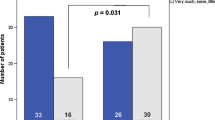Abstract
Goals of work
This questionnaire study was designed to investigate understanding, assessment and management of cancer-related anorexia–cachexia syndrome (ACS) amongst hospital staff.
Methods
Qualified nurses and doctors on general medical and surgical wards within a district general hospital were asked to complete a questionnaire enquiring about understanding of the term cachexia, routine assessment of commonly associated symptoms and approaches to management of three commonly associated symptoms (poor appetite, early satiety and dry mouth).
Main results
One hundred seventeen questionnaires were distributed with 100 returned (86% response rate). Cachexia was most frequently described as weight loss (79%) and anorexia (49%). Some symptoms (including altered appetite, constipation, nausea and vomiting) were routinely assessed during admission or review of these patients. Some common symptoms (including mouth problems, early satiety) were much less likely to be enquired about. Management of the three key symptoms demonstrated a range of approaches with little consistency. Early satiety was particularly poorly managed, with 29% of staff being unable to recognise or treat it.
Conclusions
The study highlights the variable understanding of ACS and the lack of standardised assessment and management tools amongst staff in an acute hospital setting. This is likely to lead to inconsistent, and perhaps inadequate, care of patients with palliative care needs. Greater awareness and basic pathways of care may help to improve the experience of ACS for patients with cancer.
Similar content being viewed by others
References
Andrew I, Kirkpatrick G, Holden K, Hawkins C (2008) Audit of symptoms and prescribing in patients with the anorexia–cachexia syndrome. Pharm World Sci. doi:10.1007/s11096-008-9192-9
Berenstein EG, Ortiz Z (2005) Megestrol acetate for the treatment of anorexia–cachexia syndrome. Cochrane Database Syst Rev 18:CD004310
Cooperman AM, Chivati J, Chamberlain RS (2000) Nutritional and metabolic aspects of pancreatic cancer. Curr Opin Clin Nutr Metab Care 3:17–21. doi:10.1097/00075197-200001000-00004
Davies AN (2000) A comparison of artificial saliva and chewing gum in the management of xerostomia in patients with advanced cancer. Palliat Med 14:197–203. doi:10.1191/026921600672294077
Davies AN, Daniels C, Pugh R, Sharma K (1998) A comparison of artificial saliva and pilocarpine in the management of xerostomia in patients with advanced cancer. Palliat Med 12:105–111. doi:10.1191/026921698670435903
Davis MP, Walsh D, Lagman R, Yavuzsen T (2006) Early satiety in cancer patients: a common and important but underrecognized symptom. Support Care Cancer 14:693–698. doi:10.1007/s00520-005-0015-4
Fainsinger RL, Pereira J (2004) Clinical assessment and decision-making in cachexia and anorexia. In: Doyle D, Hanks G, Cherny NI, Calman K (eds) Oxford textbook of palliative medicine. Oxford University Press, Oxford, pp 533–546
Hawkins C (2000) Anorexia and anxiety in advanced malignancy: the relative problem. J Hum Nutr Diet 13:113–117. doi:10.1046/j.1365-277x.2000.00219.x
Hopkinson J, Wright D, Corner J (2006) Exploring the experience of weight loss in people with advanced cancer. J Adv Nurs 54:304–312. doi:10.1111/j.1365-2648.2006.03818.x
Kotler DP (2000) Cachexia. Ann Intern Med 133:622–634
Macmillan (2008) Macmillan Durham Cachexia Pack. http://learnzone.macmillan.org.uk/
Spiro A, Baldwin C, Patterson A, Thomas J, Andreyev HJN (2006) The views and practice of oncologists towards nutritional support in patients receiving chemotherapy. Br J Cancer 95:431–434. doi:10.1038/sj.bjc.6603280
Springett C, Andrew I, Holden K (2005) An attitudinal survey of staff encountering patients at risk or diagnosed with cancer cachexia within a district general hospital.Proceedings of the 3rd International Cachexia Conference P1.2:76, Rome, 8–10 December 2005
Acknowledgement
Funding was received from Macmillan Cancer Support for employment of Inga Andrew. The Regional Macmillan Development Manager was a member of the 3-year project steering group but had no input to the protocol development for this study. We thank Stephen Williams and Graeme Kirkpatrick for their support.
Author information
Authors and Affiliations
Corresponding author
Electronic supplementary material
Below is the link to the electronic supplementary material.
Appendix 1
Staff Questionnaire (DOC 46 KB).
Rights and permissions
About this article
Cite this article
Churm, D., Andrew, I.M., Holden, K. et al. A questionnaire study of the approach to the anorexia–cachexia syndrome in patients with cancer by staff in a district general hospital. Support Care Cancer 17, 503–507 (2009). https://doi.org/10.1007/s00520-008-0486-1
Received:
Accepted:
Published:
Issue Date:
DOI: https://doi.org/10.1007/s00520-008-0486-1




